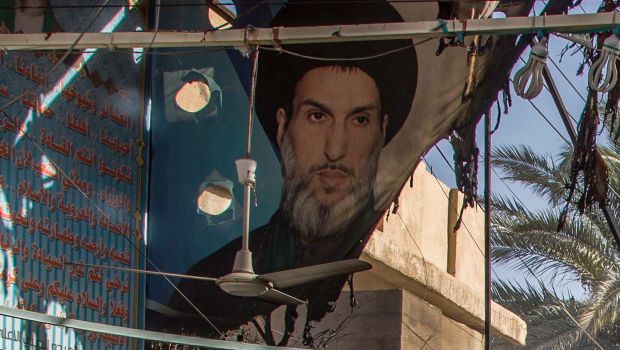
A burnt poster of Shi’ite cleric Mahmoud Al-Sarkhi at a checkpoint in front of his home in the Shi’ite holy city of Karbala, 50 miles (80 kilometers) south of Baghdad, Iraq, on July 2, 2014. (AP Photo/Ahmed al-Husseini)
Karbala, Asharq Al-Awsat—Tensions remained high in Karbala on Friday following clashes on Wednesday between followers of Ayatollah Mahmoud Al-Sarkhi and Iraqi security forces after Baghdad sought to arrest the Shi’ite cleric. Iraqi security forces destroyed Sarkhi’s home on Wednesday, andthe controversial cleric is now believed to have fled the city.
“Improvised explosive devices were found in Al-Sarkhi’s home. The house was booby-trapped, and that is why it was blown up,” Karbala Governor Aqil Al-Tarihi said during a press conference on Thursday. He added that Iraqi security forces had also arrested 350 of Sarkhi’s followers following the operation.
“Sarkhi is not a religious cleric, and when his followers picked up arms and attacked citizens, it forced us to launch the operation to arrest them. We will not allow the presence of any of Sarkhi’s followers in Karbala,” he added.
Sarkhi issued a statement saying the warrant for his arrest had been issued due to his “patriotic” stance against Grand Ayatollah Ali Al-Sistani’s fatwa calling on “all able-bodied Iraqis” to defend the country against advancing Islamic State of Iraq and Syria (ISIS) fighters.
Local media reported that around 45 people were killed in Wednesday’s clashes between Sarkhi’s supporters and Iraqi military and security forces.
Sarkhi blamed central government forces for the ensuing violence. “The army soldiers provoked those present in my headquarters, and they also attacked the Husseiniya mosque,” he said in the statement.
“These actions are the actions of militias and the result of my rejection of partition and sectarianism that has killed the people of Iraq. Their action is evidence of their failure and lack of steadfastness towards patriotic action.”
There has long been discontent among the Shi’ite clerical hierarchy towards Sarkhi, one of the youngest clerics to be awarded the title Grand Ayatollah, over his populist fatwas. Shi’ite cleric and academic Abdul-Hussein Al-Sa’idi told Asharq Al-Awsat: “The issue of Al-Sarkhi is not new; it started back in 2003 when he suddenly appeared on the scene and began to attract supporters and followers in various regions of Iraq, especially in the central and southern governorates.”
He added that Sarkhi contradicted “common traditions in Shi’ite religious seminaries where hierarchy is respected,” and that his condemnation of a fatwa issued by Sistani, the highest Shi’ite religious authority in Iraq, represented a “blatant departure from seminary traditions.
“Under the current circumstances facing Iraq, what Sarkhi and his supporters have done is an attempt to create Shi’ite–Shi’ite sedition and cause unrest in the southern governorates, as an extension to what is taking place in western Iraq.”
